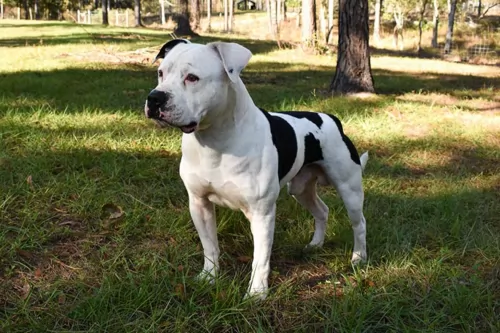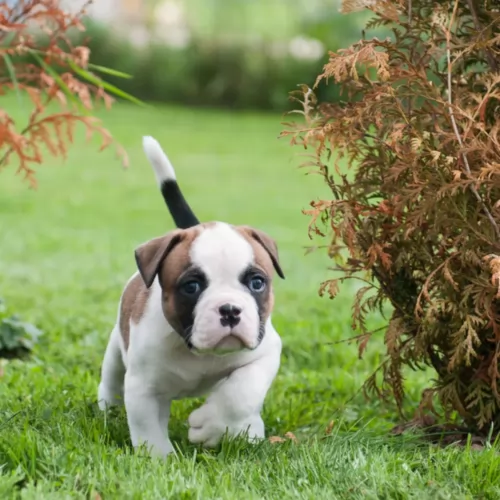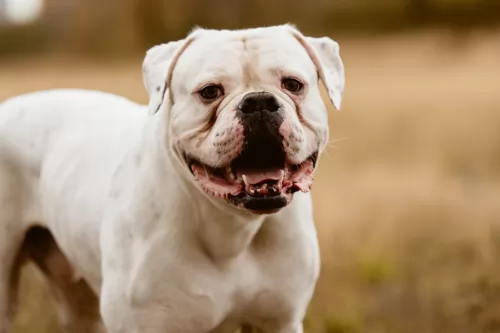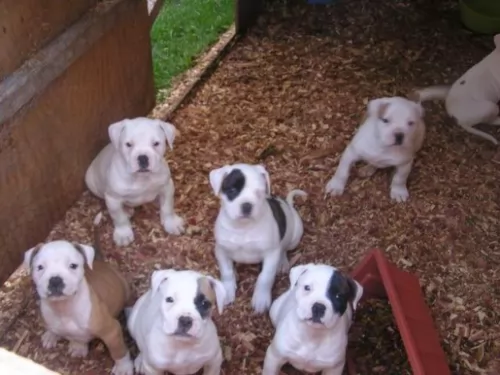 Petzlover
Petzlover American Bulldog is originated from United States but Northern Inuit Dog is originated from United Kingdom. American Bulldog may grow 11 cm / 4 inches shorter than Northern Inuit Dog. American Bulldog may weigh 6 kg / 14 pounds more than Northern Inuit Dog. Both American Bulldog and Northern Inuit Dog has almost same life span. Both American Bulldog and Northern Inuit Dog has same litter size. American Bulldog requires Low Maintenance. But Northern Inuit Dog requires Moderate Maintenance
American Bulldog is originated from United States but Northern Inuit Dog is originated from United Kingdom. American Bulldog may grow 11 cm / 4 inches shorter than Northern Inuit Dog. American Bulldog may weigh 6 kg / 14 pounds more than Northern Inuit Dog. Both American Bulldog and Northern Inuit Dog has almost same life span. Both American Bulldog and Northern Inuit Dog has same litter size. American Bulldog requires Low Maintenance. But Northern Inuit Dog requires Moderate Maintenance
 Following World War II, the American Bulldog was almost extinct.
Following World War II, the American Bulldog was almost extinct.
Thanks to John D. Johnson from Summerville, Georgia the breed is still with us today. He gathered the best dogs he could find throughout the rural South and bred them back into popularity among his family and other rural families. His father bred the American Bulldog before John did and they have bred them longer than any other in any part of the world. His dogs were regularly used for tracking, hunting, guarding, watchdog and weight pulling. At some point Alan Scott joined Johnson breeding other bulldogs to Johnson's and forming the Standard American Bulldog.
The American Bulldog/ is popular today as a family pet and companion as well as a working dog.
 Looking at the beautiful Northern Inuit Dog, you’ll think that this crossbred dog is a wolf.
Looking at the beautiful Northern Inuit Dog, you’ll think that this crossbred dog is a wolf.
As with many other dogs, there are sometimes different stories regarding their history. It was in the 1980's that founder of the breed, Eddie Harrison, bred a number of mixed-breed rescue dogs with Siberian Huskies, German Shepherds and Alaskan Malamutes to produce the early Northern Inuit dogs. This is a dog that closely resembled a wolf in looks but which has the more companionable characteristics of the domesticated dog.
The dog is only recognized by its own independent breed club, but by none of the other major kennel clubs.
 The American Bulldog is a powerful and muscular dog in a sturdy and compact frame. The female is more refined than the heavy boned and stocky male, but both genders are athletic, agile and quick. The have large heads, strong jaws, a muscular neck and with a moderately deep and wide chest.
The American Bulldog is a powerful and muscular dog in a sturdy and compact frame. The female is more refined than the heavy boned and stocky male, but both genders are athletic, agile and quick. The have large heads, strong jaws, a muscular neck and with a moderately deep and wide chest.
They have a square head, with muscular cheeks and a clearly defined furrow between his eyes. With broad, square and strong muzzles, they have a reverse scissors, scissors, moderate underbite and an even bite. Ears come in a variety of shapes and sizes and eyes can be any color as well. The nose however should be black and lips black as well. Their legs are strong, heavy boned and straight with well-defined muscles in the hindquarters. Finally ,they have a thick, low set tail that comes to a point at the end.
 Friendly, calm and gentle, the Northern Inuit Dog is a crossbreed, described as a medium to large sized dog that stands at roughly 58– 81cm in height, male and female, and weighs in the region of 25–48kg.
Friendly, calm and gentle, the Northern Inuit Dog is a crossbreed, described as a medium to large sized dog that stands at roughly 58– 81cm in height, male and female, and weighs in the region of 25–48kg.
He has a double coat in typical wolf shades of grey, white, black and cream. He is regarded as a moderate shedder. The ears are erect, the face bright, intelligent and alert and the tail long, bushy and straight.
The Northern Inuit dog is independent, strong-willed and stubborn, and if you want to own one of these dogs, your dog will respond well if you are firm, fair, strong, kind and consistent. This is because the dog is stubborn, sharp, independent and intelligent.
The owner of such a dog must be a firm leader. Training and socialization should start when the dog is still young. He is good with kids, being playful and affectionate with them.
 The American Bulldog is characteristically loyal, brave and reliable. It is a friendly, gentle dog that truly loves children. There is not a hostile bone in his body despite his history and reputation for bull baiting. Though he is protective of its family and affectionate with most, he still needs a human companion who is strong willed and a genuine pack leader. Without this he might become aggressive around other dogs and pets. They are immensely self-confident and they do slobber and drool and will become excited and hard to handle without daily exercise of both their body and their minds.
The American Bulldog is characteristically loyal, brave and reliable. It is a friendly, gentle dog that truly loves children. There is not a hostile bone in his body despite his history and reputation for bull baiting. Though he is protective of its family and affectionate with most, he still needs a human companion who is strong willed and a genuine pack leader. Without this he might become aggressive around other dogs and pets. They are immensely self-confident and they do slobber and drool and will become excited and hard to handle without daily exercise of both their body and their minds.
 It’s not surprising that people who love wolves would want a similar looking pet. However, they also want this wolf-like dog to be a friend and companion. This is precisely what they get with the beautiful Northern Inuit dog.
It’s not surprising that people who love wolves would want a similar looking pet. However, they also want this wolf-like dog to be a friend and companion. This is precisely what they get with the beautiful Northern Inuit dog.
With his bright, alert face, the Inuit is actually a calm, gentle dog, bonding closely with his human family and not showing any aggression.
Intelligent and social, and somewhat stubborn, when you provide him with the home he deserves, you’ll see that this beautiful creature can be relied on to be a wonderful family pet.
 Though generally healthy, the American Bulldog is prone to a few problems.
Though generally healthy, the American Bulldog is prone to a few problems.
This is a serious issue in many breeds of dogs and is especially prevalent with the American Bull Dog. This may seem ironic in such a short legged dog but it is unfortunately very common. It is a genetic disorder that causes the bones in the joint to separate and causes the dog much pain and lameness.
Due to skin folds you need to be care and watch for irritation and infection in the folds. They are also prone to ear infections.
The American Bulldog is prone to overeating and all the health issues that presents. With short legs and a genetic predisposition to arthritis and hip dysplasia, obesity is a real health risk for your bulldog.
 There are some genetic problems with this dog breed, although with good care, you are highly unlikely to see your dog with them.
There are some genetic problems with this dog breed, although with good care, you are highly unlikely to see your dog with them.
Some of these are hip dysplasia and epilepsy.
Hips are always a worrisome aspect with dogs as it can bring on lameness. There are some things that can be done to reduce the incidence of hip dysplasia.
Joint laxity in dogs occurs when the head of the femur doesn’t fit into the acetabulum properly. This could be the result of several things such as the dog being overweight, injury or something else.
Epilepsy in dogs is a chronic condition that results in seizures. This neurological disorder is actually a life-long disease, occurring when there is abnormal electrical activity in the brain and which changes a dog’s behavior.
Some breeds are more predisposed to epilepsy than others but you will need to get your dog to the vet when you see your pet jerking uncontrollably. Most of these epileptic fits happen without warning, they last a few seconds to a minute or so and stop on their own.
 It’s no longer cheap caring for a dog – just like with a child, by bringing a dog into your home, you have a responsibility to care for it.
It’s no longer cheap caring for a dog – just like with a child, by bringing a dog into your home, you have a responsibility to care for it.
If you bring a puppy into your home, you will need to feed him 4x a day. If you feed him commercially manufactured food it will need to be specially formulated for puppies. You will have to read on the packaging to make sure you get the right food.
Later on your pet can start having one or two meals a day. Two smaller meals is best as then he doesn’t gobble up his food too fast which can lead to a life-threatening condition known as bloat. Home-made food is always a welcome treat for your pet, but keep it simple and consistent. Boiled chicken, brown rice or pasta and some cooked vegetables such as carrots, sweet potatoes and spinach chopped up and added to his dry kibble can offer him some variety from time to time as well as also adding in some raw meat when you get the chance. He must always have access to fresh, cool water.
Your puppy will be due at the vet for his first vaccinations. Your puppy's first vaccination will usually be at about 8 weeks of age.
Your new pet will require a warm, dry, comfortable place to sleep and to retreat to.
You will need to provide him with chewy toys to stimulate him both mentally and physically.
You will need to exercise your pet – nice long walks, ball- and rope games etc.
Nearly every dog sheds, and the Northern Inuit will require you brushing him twice a week to remove all those loose hairs. During the brushing session, check him over for fleas and ticks and run your hands over him and make sure there are no unusual lumps on his body.